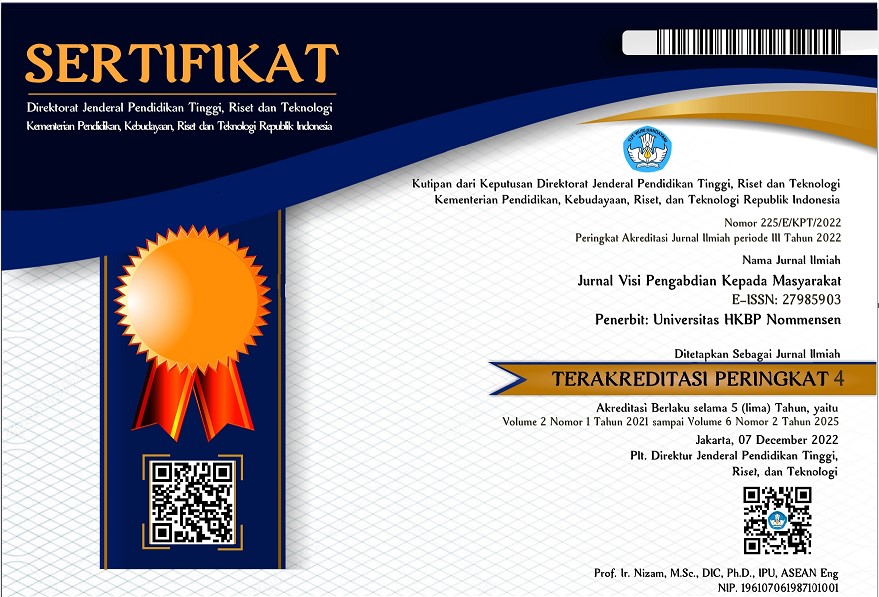Perlindungan Konsumen Terhadap Penggunaan Bahan Pengawet Makanan Menurut Undang-Undang Nomor 8 Tahun 1999 Tentang Perlindungan Konsumen
DOI:
https://doi.org/10.51622/pengabdian.v2i2.368Keywords:
Consumer Protection, Danger FoodsAbstract
The use of hazardous materials used as food additives that are prohibited by the government is the main problem in the development of the goods and services industry, business actors will seek the highest profit without providing guarantees for the quality of goods and / or services produced and / or traded based on the provisions of goods quality standards and / or applicable services. The compensation in question can be in the form of health care and the provision of compensation to consumers who have been injured or their heirs or an agreement from the parties themselves. In carrying out every activity, the business actor is responsible for what it produces. Every violation of norms and several actions that are contrary to the aim of creating a healthy business climate can be categorized as illegal actions.
Therefore, business actors will be subject to legal sanctions in the form of administrative, civil and criminal sanctions. This is regulated in Article 19 of Law of the Republic of Indonesia Number 8 of 1999 concerning Consumer Protection. Legal sanctions against food business actors who are proven to have committed an offense by using hazardous substances in the production process are carried out in the form of withdrawing food products, temporarily stopping production until the related problem is resolved and withdrawing food numbers from the household industry, destroying the food or drink if it is proven to endanger health. and human souls, and revocation of production permits or business permits.
Downloads
References
Lailia, Sevi (2007)., Penggunaan Bahan Tambahan Pangan(Pengawet) Dalam Makanan Ditinjau Dariperspektif Hukum Positif Dan Hukum Islam.,Other Thesis, University Of Muhammadiyah Malang.
Afrianti Leni,(2010)., Pengawet Makanan Alami dan Sintesis, Bandung: Alfabeta.
Sudaryatmo.(1995)., Masalah Perlindungan di Indonesia, Bandung: Citra Aditya Bhakti
Sidabalok Janus (2006), Hukum Perlindungan Konsumen Indonesia, Bandung: PT Aditya Bhakti.
Sofie dan Yusuf (2006), Perlindungan Konsumen dan Instrumen-instrumen Hukumnya, Bandung: Citra Aditya Bhakti.
Siahaan N.H.T, 2005, Hukum Konsumen Perlindungan Konsumen Dan Tanggung Jawab Produk, Jakarta: Panta Rei.
Hamid, Abd Haris, 2017, Hukum Perlindungan Konsumen Indonesia, Jakarta: Gramedia, hlm. 2.
Gunawan Widjaja dan Ahmad Yani, 2000, Hukum tentang Perlindungan Konsumen, Jakarta: Gramedia, hlm. 12.
Basrowi,2005, Pengantar Sosiologi, Jakarta: Ghalia Indonesia, 2005, hlm. 170.
Adrian Sutedi, 2008, Tanggung Jawab Produk Dalam Hukum Perlindungan Konsumen, Ghalia Indonesia: Ciawi-Bogor, hlm 32,
Peraturan perundang-undangan
Undang-Undang No 18 Tahun 2012 Tentang Pangan
Undang-Undang Nomor 35 Tahun2009 tentang Narkotika
Peraturan Menteri Kesehatan RI No. 722/ Menkes/Per/IX/1988 dan SNI 01-354-1994
Undang-Undang Nomor 8 Tahun 1999 Tentang Perlindungan Konsumen
Jurnal:
Dharu Triasih, B. Rini Heryanti, Doddy Kridasaksana, 2017, Kajian Tentang Perlindungan Hukumbagi Konsumen Terhadap Produk Makanan Bersertifikat Halal, Vol 18, No 2, Desember 2016, hal, 1-12.
Sri Lestari Poernomo, 2020, Analisis Perlindungan Hukum Konsumen Produk Makanan Kemasan Yang Beredar Di Kota Makassar,Vol 3 No. 1, April, hal 41-58.
V.Vinola, N.Syahruddin, Y.Ahyuni, 2021, Perlindungan Hukum Bagi Konsumen Terhadap Beredarnya Makanan Kadaluwarsa,Vol 2 No. 2 Februari, hal. 569-582.
Imam Taufiq, 2017, Analisis Yuridis Perlindungan Konsumen Terhadap
Peredaran Makanan Kadaluwarsa Di Wilayah Kabupaten Sukoharjo, hal 1-15
Published
How to Cite
Issue
Section
Copyright (c) 2021 Roida Nababan, Jinner Sidauruk, Besty Habeahan, Lesson Sihotang, Dakka Hutagaol

This work is licensed under a Creative Commons Attribution 4.0 International License.












